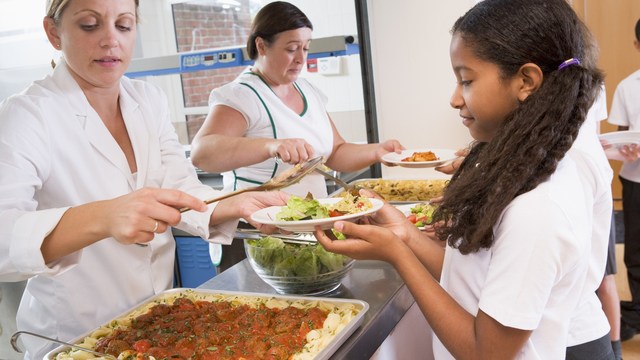 MonkeyBusiness Images/PhotoSpin
MonkeyBusiness Images/PhotoSpin
It's that time of year again, with most children heading back to school soon and -- can you believe it? -- some have already been back for a few weeks. It seems odd to me that where I live in Arizona, the kids started school in late July. Back east, we were still at the Jersey Shore eating Choco Tacos on the beach until Labor Day.
That being said, back to school means time for school lunches and less play time.
While most school lunches do not include the above-mentioned summer treat, a new study, as featured on ScienceDaily.com, says there is a link between school lunches and childhood obesity. The study also coupled their cafeteria choices with the amount of time kids spend watching TV.
The study was conducted by the University of Michigan Frankel Cardiovascular Center and will be published in the September, 2013 issue of Pediatrics.
The study looked at approximately 1,700 eleven-year-olds who were enrolled in the University of Michigan-sponsored “Project Healthy Schools Program.”
Project Healthy Schools' goal is to improve the students health behaviors by encouraging kids to “eat more fruits and vegetables, make better beverage choices, be active, eat less fast and fatty foods, spend less time in front of a screen.”
Some of the findings of the study showed that “girls who drank two servings of milk each day were less likely to be obese, and boys who played on a sports team were also at a healthier weight.” One of the explanations offered by researchers is that girls exchanged sugary drinks for milk.
More than half of the obese kids also said they watched two or more hours a day of television. The key difference is how that spent their screen time. “When asked, obese girls were more likely than any other group to use a computer. Obese boys reported playing video games more often than normal weight boys.”
According to the Centers For Disease Control and Prevention, “Childhood obesity has more than doubled in children and tripled in adolescents in the past 30 years. The percentage of children aged 6–11 years in the United States who were obese increased from 7% in 1980 to nearly 18% in 2010. Similarly, the percentage of adolescents aged 12–19 years who were obese increased from 5% to 18% over the same period.”
Study leader Morgen Govindan said that perhaps being more gender specific in how we deal with the childhood obesity epidemic could help. “"Exploring such gender-related differences in a larger group may help in refining the interventions to promote weight loss and prevent obesity among middle school children."
Sources:
“School Lunch and TV Time Linked With Childhood Obesity – ScienceDaily.com.” Science Daily. Web Aug. 13 2013.
http://www.sciencedaily.com/releases/2013/08/130812103006.htm
“How PHS Works – ProjectHealthySchools.org.” Project Healthy Schools. Web Aug. 13 2013.
http://www.projecthealthyschools.org/learn/how.html
“Adolescent and School Health – Childhood Obesity Facts – CDC.gov.” Centers for Disease Control and Prevention. Web Aug. 13 2013.
http://www.cdc.gov/healthyyouth/obesity/facts.htm
Joanne Sgro-Killworth is a Television Fitness Expert, Certified Personal Trainer and Sport Nutritionist. She is Certified in Pilates, Pre-natal/Post-Partum, Yoga and Senior Fitness. She specializes in Weight Loss, Post-Rehab and Post Cancer Training.
Joanne's fitness plans and recipes are available globally on her website www.happiwoman.com/ She resides in the Phoenix, AZ area with her husband and son, where she runs her personal training business, Fitness Answer, LLC.
Reviewed August 13, 2013
by Michele Blacksberg RN
Edited by Jody Smith



Add a Comment1 Comments
School lunch choices are essential for our children to not only be healthy but also concentrate on learning.
August 20, 2013 - 10:39pmThis Comment